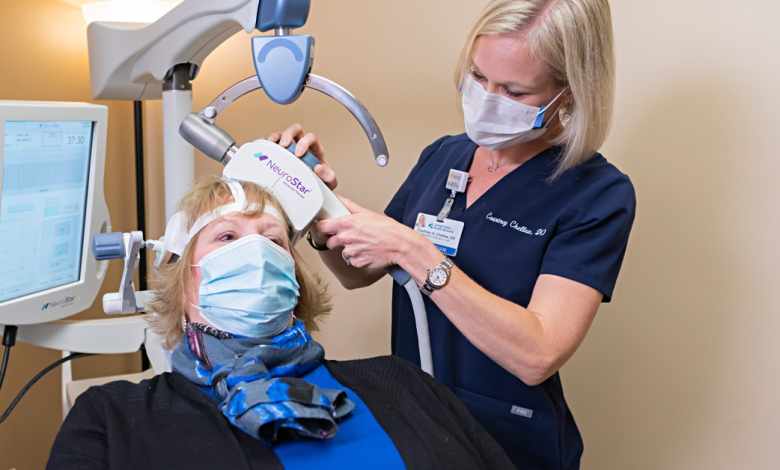Transcranial Magnetic Stimulation: Alternative Treatment for Depression

Although depression is one of the most common mental ailments in the United States and the leading cause of disability worldwide, standard medicinal treatment options for depression are largely unreliable. Treating depression is an individualized process. In addition to psychological therapy, many people with depression need a medication or other additional treatment to manage symptoms day to day. Unfortunately, two-thirds of individuals who try an antidepressant do not get relief from the first medication.
Finding the right antidepressant can be a long, exhausting process, as each medication has several side effects and affects everyone differently. Additionally, drugs offer temporary relief but stop working as soon as the individual stops taking them, encouraging medicinal dependence. Many people with depression try multiple antidepressants and still don’t find relief.
For people who have treatment-resistant depression, transcranial magnetic stimulation, or TMS, is an alternative option. While the technology has been used in the clinical field since 1985, it wasn’t discovered as a depression treatment until years later. In 2008, it became FDA-approved for treatment-resistant depression, and is now available at a number of TMS clinics such as TMS & Brain Health. Some companies are now developing handheld TMS devices that can be used at home. It is proving to be extremely promising — over 60% of patients who try TMS see significant results, and almost 40% experience full remission, or complete symptom relief. TMS is also unique in that it offers lasting symptom relief; patients typically see results that last up to a year after treatment ends.
What is TMS?
Transcranial magnetic stimulation is a non-invasive process that uses a small machine to send magnetic pulses into the brain in order to stimulate neural activity. Specific areas in the brain can be targeted depending on the goal; when treating depression, the area of the brain in the basal ganglia known to be related to depression is targeted. There are multiple types of TMS, but the two most common for depression treatment are repeated-pulse (rTMS) and theta burst stimulation or Express TMS.
Repeated-pulse TMS involves sending a chain of magnetic pulses at a fixed frequency. This type of TMS typically takes about 30 minutes. Theta burst stimulation (TBS) sends magnetic pulses at a frequency that mimics brain waves; this encourages neuroplasticity and only takes a few minutes, giving it the name Express TMS.
A standard TMS treatment consists of 5 TMS sessions per week for 6 weeks, for a total of 30 sessions. After the treatment course, patients can schedule additional sessions as needed. Each session will last about 20 to 40 minutes, which includes time to calibrate the machine. During treatment, patients can sit comfortably and pass time reading, watching TV, or listening to music. Patients will start to see results anywhere from 2 weeks after the first session to the end of the treatment course.
Is TMS safe?
TMS actually has one of the highest safety ratings of any depression treatment. The biggest risk of treatment is risk of seizure, which is less than 0.01% and is typically linked to a preexisting risk of seizure. For this reason, some patients with certain neurological predispositions, such as epilepsy, may not be eligible for TMS treatment. Additionally, TMS is not given to patients with any kind of metal implants. You can contact a TMS clinic to find out your eligibility to receive TMS treatment.
The side effects of TMS are also extremely mild. Patients typically report feeling a knocking sensation or sensitivity on the scalp while the machine is on. Other side effects include headache or lightheadedness that subsides shortly after the treatment.
TMS is also used to treat a variety of other mental conditions, such as anxiety, PTSD, OCD, and some types of chronic pain, such as migraines. It will become more accessible as research continues and it becomes a more popular treatment. For now, it remains a promising treatment option for individuals with treatment-resistant depression and other conditions. Depending on their medical history, some patients can have their treatment covered by insurance.
At TMS & Brain Health, medical professionals work with patients to develop a personalized treatment plan that suits their needs and schedule. Combining TMS with other treatments like therapy is the best way to give individuals the relief and support they need.
For any important information please contact us Email GadgetsNg info@gadgetsng.com
[Button id="1"]




Suivre le téléphone portable – Application de suivi cachée qui enregistre l’emplacement, les SMS, l’audio des appels, WhatsApp, Facebook, photo, caméra, activité Internet. Idéal pour le contrôle parental et la surveillance des employés. Suivre le Téléphone Gratuitement – Logiciel de Surveillance en Ligne. https://www.xtmove.com/fr/
urveillez votre téléphone de n’importe où et voyez ce qui se passe sur le téléphone cible. Vous serez en mesure de surveiller et de stocker des journaux d’appels, des messages, des activités sociales, des images, des vidéos, WhatsApp et plus. Surveillance en temps réel des téléphones, aucune connaissance technique n’est requise, aucune racine n’est requise.
When seeking academic assistance, it’s essential to papers owl consider writing service reviews. One notable platform is renowned for its reliability and quality. They excel in content creation, offering expertly crafted essays and papers.